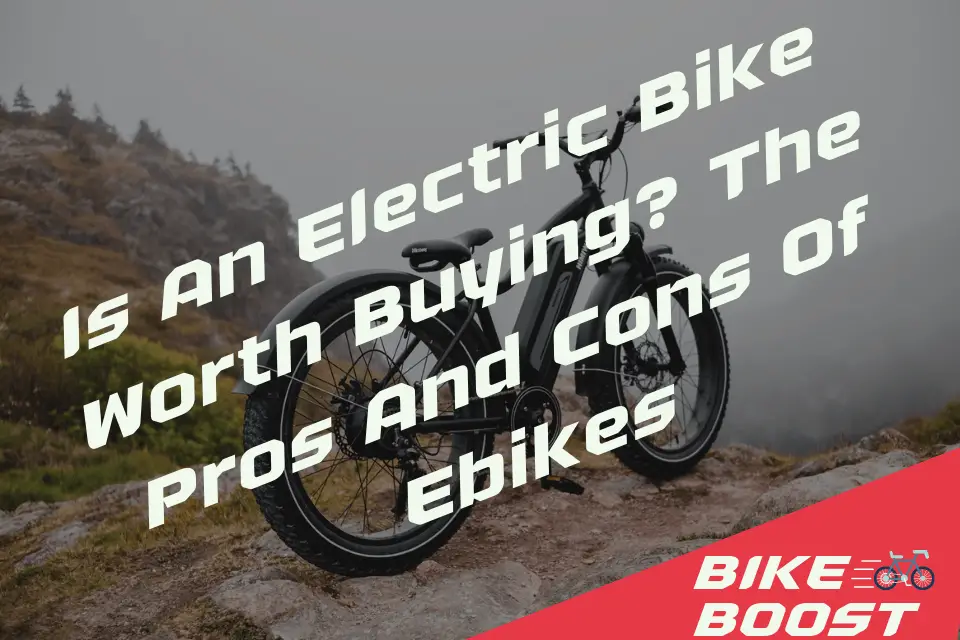We love writing these guides for you and sometimes we are compensated when you use one of our links to buy a product. This doesn’t impact the final price you pay. If you want to learn more about how this works, please see our Affiliate Disclosure page.
Electric bikes, also known as e-bikes, have gained significant popularity in recent years. They offer a convenient and environmentally friendly alternative to traditional bicycles, making commuting and recreational cycling more accessible for a wide range of individuals. If you’re considering purchasing an electric bike but aren’t sure if it’s worth the investment, this article will explore the various factors to help you make an informed decision.
Key Takeaways:
- Electric bikes offer convenience, health benefits, and environmental friendliness.
- Consider factors such as cost, battery life, motor power, and design when buying an electric bike.
- While electric bikes have disadvantages like limited range and higher initial cost, they can be a worthwhile investment based on individual needs and preferences.

What is an Electric Bike?
Before diving into the benefits and considerations of owning an electric bike, let’s briefly understand what an electric bike is. An electric bike is essentially a bicycle with an integrated electric motor and battery. This motor assists the rider by providing additional power when pedaling, allowing for easier and faster cycling experiences.
The Benefits of Electric Bikes
Convenience and Accessibility
One of the significant advantages of electric bikes is their convenience. With the assistance of an electric motor, riders can cover longer distances with less effort, especially when faced with challenging terrains or steep hills. Commuters can arrive at their destinations without breaking a sweat, making e-bikes an excellent option for those who want to avoid arriving at work or social events exhausted.
Health and Fitness Benefits
Contrary to the misconception that electric bikes make riders lazy, they can actually provide health and fitness benefits. While e-bikes do offer assistance, riders still need to pedal, albeit with less effort. This gentle exercise can help improve cardiovascular health, muscle tone, and joint mobility. It also encourages individuals who may be less physically active to incorporate cycling into their daily routines.
Environmental Friendliness
Another compelling reason to consider an electric bike is their positive impact on the environment. Electric bikes produce zero emissions and are much cleaner compared to cars or motorcycles. By choosing an e-bike over a traditional vehicle for short trips or commutes, you can contribute to reducing air pollution and carbon footprint.
Factors to Consider When Buying an Electric Bike
Before making a purchase, it’s important to evaluate several factors to ensure you choose an electric bike that suits your needs. These factors include:
Cost
Electric bikes come in a range of prices, depending on their features and specifications. It’s essential to set a budget and consider the long-term savings from reduced fuel costs and maintenance expenses. While higher-end models may offer more advanced features, there are affordable options available that still provide a reliable and enjoyable riding experience.
Battery Life and Range
The battery is a crucial component of an electric bike. Consider the battery life and range, which determines how far you can travel on a single charge. Factors such as terrain, rider weight, and assistance level affect the battery performance. Ensure that the e-bike you choose offers sufficient range for your intended purposes.
Motor Power and Performance
The motor power plays a significant role in an electric bike’s performance. Higher wattage motors generally offer better acceleration and climbing abilities. Consider your riding preferences and the type of terrain you will encounter to determine the appropriate motor power for your needs.
Bike Design and Comfort
The design and comfort of an electric bike are essential for an enjoyable riding experience. Factors to consider include frame size, ergonomics, suspension, and seating position. Test ride different models to find a bike that provides a comfortable and stable ride for your body type and preferences.
Electric Bikes vs. Conventional Bikes
Speed and Distance
Compared to conventional bikes, electric bikes can reach higher speeds and cover longer distances. The electric motor assists riders, allowing them to maintain a consistent speed and travel further without exerting excessive effort. This makes e-bikes ideal for commuting or recreational rides where speed and distance matter.
Effort and Physical Fitness
While electric bikes offer assistance, they still require pedaling from the rider. The level of assistance can be adjusted, allowing individuals to determine the amount of effort they want to exert. This flexibility makes e-bikes suitable for riders of various fitness levels, providing an opportunity to cycle and improve physical fitness at a comfortable pace.
Terrain and Uphill Riding
Conventional biking can be challenging on hilly terrains, particularly for those who are less physically fit. Electric bikes make uphill riding easier and more enjoyable. The motor assistance helps riders conquer steep inclines with less effort, expanding the range of possible cycling routes and destinations.
Electric Bike Maintenance and Upkeep
To ensure the longevity and optimal performance of your electric bike, proper maintenance and upkeep are essential. Here are some maintenance tips to keep in mind:
Battery Maintenance
Proper care of the battery is crucial for maximizing its lifespan. Follow the manufacturer’s guidelines regarding charging, storage, and usage. Avoid extreme temperatures and regularly check the battery’s condition to ensure it remains in good health.
Regular Servicing
Just like conventional bikes, electric bikes require regular servicing to keep all components in proper working order. Schedule routine maintenance appointments with a qualified bicycle technician to check the motor, brakes, gears, and overall bike condition.
Cleaning and Storage
Clean your electric bike regularly to remove dirt and debris that may affect its performance. Use appropriate cleaning agents and avoid excessive water exposure to prevent damage. When not in use, store the e-bike in a dry and secure location to protect it from the elements and potential theft.
Safety Considerations

Safety should always be a priority when riding an electric bike. Here are some essential safety considerations:
Helmet Usage
Wearing a helmet is crucial for protecting your head in case of an accident. Always wear a properly fitting helmet when riding an electric bike to reduce the risk of head injuries.
Traffic Rules and Regulations
Adhere to traffic rules and regulations when riding an electric bike. Observe speed limits, yield to pedestrians, and use hand signals to communicate your intentions to other road users. Stay informed about local cycling laws to ensure a safe and legal riding experience.
Awareness and Visibility
Be aware of your surroundings and stay vigilant while riding. Keep an eye out for potential hazards, such as potholes or road debris. Enhance your visibility by wearing bright-colored clothing and using lights and reflectors, especially when riding at night.
Who Should Consider Buying an Electric Bike?
Electric bikes cater to a diverse range of individuals with different needs and preferences. Consider the following groups of people who can benefit from owning an electric bike:
Commuters
Electric bikes offer a practical transportation solution for commuters. They allow individuals to bypass traffic congestion, save on fuel costs, and arrive at their destinations feeling fresh and energized.
Elderly Individuals
For elderly individuals or those with physical limitations, electric bikes can provide a renewed sense of freedom and independence. The motor assistance helps overcome physical barriers, allowing them to enjoy cycling and maintain an active lifestyle.
Fitness Enthusiasts
Fitness enthusiasts can also benefit from electric bikes. These bikes offer an opportunity to engage in low-impact exercise, making cycling more accessible to individuals recovering from injuries or those who want to gradually increase their fitness levels.
Common Misconceptions about Electric Bikes
Despite their numerous benefits, electric bikes are sometimes subject to misconceptions. Let’s debunk a few common myths:
Lack of Exercise
Some argue that electric bikes eliminate the need for physical exertion, but this is not entirely true. While e-bikes offer assistance, riders still need to pedal. The level of assistance can be adjusted, allowing individuals to find a balance between effort and enjoyment.
Cheating
There’s a perception that electric bike riders are “cheating” compared to those on conventional bikes. However, the purpose of an electric bike is not to compete with traditional cyclists but to provide an alternative means of transportation and recreation.
Heavy and Bulky
Another misconception is that electric bikes are heavy and cumbersome. While electric bikes are generally heavier than traditional bikes due to the added motor and battery, advancements in technology have led to lighter and more compact designs. Many electric bikes are now comparable in weight to conventional bicycles.
Conclusion
In conclusion, electric bikes offer a range of benefits that make them worth considering for many individuals. They provide convenience, health benefits, and environmental friendliness. When purchasing an electric bike, factors such as cost, battery life, motor power, and design should be taken into account. Electric bikes complement conventional bicycles and cater to various groups, including commuters, the elderly, and fitness enthusiasts. By debunking misconceptions and adhering to safety guidelines, electric bike owners can enjoy the advantages of this innovative mode of transportation and recreation.
Andy is an avid cyclist who enjoys nothing more than a ride out in the hills. Competing in track, road, time trial and mountain bike events in the past, he prefers slower rides out with his family these days.
